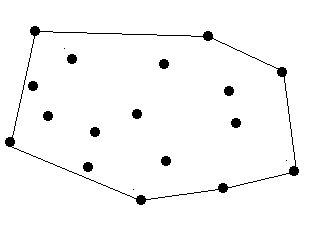|
|
Surround the TreesTime Limit: 2000/1000 MS (Java/Others) Memory Limit: 65536/32768 K (Java/Others)Total Submission(s): 8113 Accepted Submission(s): 3095
Problem Description
There are a lot of trees in an area. A peasant wants to buy a rope to surround all these trees. So at first he must know the minimal required length of the rope. However, he does not know how to calculate it. Can you help him?
The diameter and length of the trees are omitted, which means a tree can be seen as a point. The thickness of the rope is also omitted which means a rope can be seen as a line.  There are no more than 100 trees.
Input
The input contains one or more data sets. At first line of each input data set is number of trees in this data set, it is followed by series of coordinates of the trees. Each coordinate is a positive integer pair, and each integer is less than 32767. Each pair
is separated by blank.
Zero at line for number of trees terminates the input for your program.
Output
The minimal length of the rope. The precision should be 10^-2.
Sample Input
Sample Output
Source
Recommend
|
http://www.cnblogs.com/Booble/archive/2011/02/28/1967179.html 可参考
Jarvis步进法:
算法流程
1.找横坐标最小的点(有一样的话纵坐标更小的)
2.从这点开始卷包裹 找最靠近外侧的点(通过叉积比较)
(注意一开始设k为0 若k=0随意找个点为其值)
3.找到的点为起点退出
注:为什么第二步的时候不怕找到过延长线的点?因为不可能存在这个点,若有这个点 在上一个点就被选择拓展了
叉积为0时 注意用点积判断 选择最外面那个点
#include <cstdio>
#include <cstdlib>
#include <cmath>
#include <cstring>
#include <ctime>
#include <algorithm>
#include <iostream>
#include <sstream>
#include <string>
#define oo 0x13131313
#define exp 10e-6
using namespace std;
struct point{
double x,y;
};
double ans;
int start;
point a[101];
int visit[101];
int N;
double crossdet(double x1,double y1,double x2,double y2)
{
return x1*y2-x2*y1;
}
double cross(point A,point B,point C)
{
return crossdet(B.x-A.x,B.y-A.y,C.x-A.x,C.y-A.y); //AB*AC
}
double dotdet(double x1,double y1,double x2,double y2)
{
return x1*x2+y1*y2;
}
double dot(point A,point B,point C)
{
return dotdet(B.x-A.x,B.y-A.y,C.x-A.x,C.y-A.y); //AB dot AC
}
double dist(point A,point B)
{
return sqrt((A.x-B.x)*(A.x-B.x)+(A.y-B.y)*(A.y-B.y));
}
int sgn(double A)
{
if(fabs(A)<exp) return 0;
else if(A>0) return 1;
else return -1;
}
void input()
{
ans=0;int sx=40000;int sy=40000;
memset(a,0,sizeof(a));
memset(visit,0,sizeof(visit));
for(int i=1;i<=N;i++)
{
scanf("%lf%lf",&a[i].x,&a[i].y);
if(sgn(a[i].x-sx)==-1)
{
sx=a[i].x;sy=a[i].y;
start=i;
}
else if(sgn(a[i].x-sx)==0&&sgn(a[i].y-sy)==-1)
{
sx=a[i].x;sy=a[i].y;
start=i;
}
}
}
void init()
{
freopen("a.in","r",stdin);
freopen("a.out","w",stdout);
}
int FIND(int now)
{
int k=0;
for(int i=1;i<=N;i++)
{
if(visit[i]==0&&i!=now)
{
if(k==0)
{
k=i;
}
else
{
int temp=cross(a[now],a[k],a[i]);
if(sgn(temp)<0)
k=i;
if(sgn(temp)==0)
{
int temp2=dot(a[k],a[now],a[i]);
if(sgn(temp2)<0)
k=i;
}
}
}
}
visit[k]=1;
return k;
}
void solve()
{
int now=start,next;
while(1)
{
next=FIND(now);
ans+=dist(a[now],a[next]);
now=next;
if(next==start) break;
}
}
int main()
{
// init();
while(cin>>N&&N)
{
input();
solve();
if(N==2)
{
ans=dist(a[1],a[2]);
}
if(N==1) ans=0;
printf("%.2lf
",ans);
}
return 0;
}